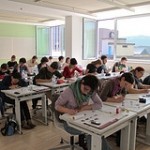 The DLG8 posted the question: do human-technology relations within online environments benefit performance in education?
The DLG8 posted the question: do human-technology relations within online environments benefit performance in education?
It may be easy (an interesting) to look at trends in grades on standardized exams over time with technological developments in education. But, is this a valid measure of performance in education? Our tendancy to focus on student grades may in fact be a part of a “hermenutic circle” where the question of grades itself which we find so important, is heavily influenced by our own western culture and history. Are grades on standardized tests a good measure of student performance?
One of the main criticisms of education identified by Dall’Alba and Barnacle is that the western epistemological approach tends to separate content from context. Standardized exams, as they exist today, perpetuate this decontextualizing of learning and performance. Students are rewarded for doing well in an artificial performance environment – the big exam. Grades are the hard evidence of education that distinguish students from each other and guide decisions on what students should do with their lives. But how valid are examinations given that students are measured in ways much different than the performance required of them in life and work contexts.
Dall’Alba and Barnacle (2005) suggest that student evaluation should involve the “integration of knowing, acting, and being in the form of embodied knowledge.” I’m not sure there is a good way to measure this kind of learning. I suppose the closest we have come to this might be performance-based assessment, but even that seems to be marginalized as an assessment practice in educational institutions.
The assessment question aside, I can’t help but think that human-technology relation within the online environment benefit the learning process in many cases. The online environment is saturated with information and opinion. I believe the process of discussing and debating web content contributes positively to learning. But as learning begins to take place in more uncontrolled yet authentic online environments, educators may have to rethink their approach to performance measurement.
Reference
Dall’Alba, G. & Barnacle, R. (2005). Embodied knowing in online environments. Educational Philosophy and Theory, 37(5), 719-744
Image by zeligfilm courtesy Flickr

0 responses so far ↓
There are no comments yet...Kick things off by filling out the form below.
Leave a Comment